Plant These 14 Thorny Plants to Deter Trespassers
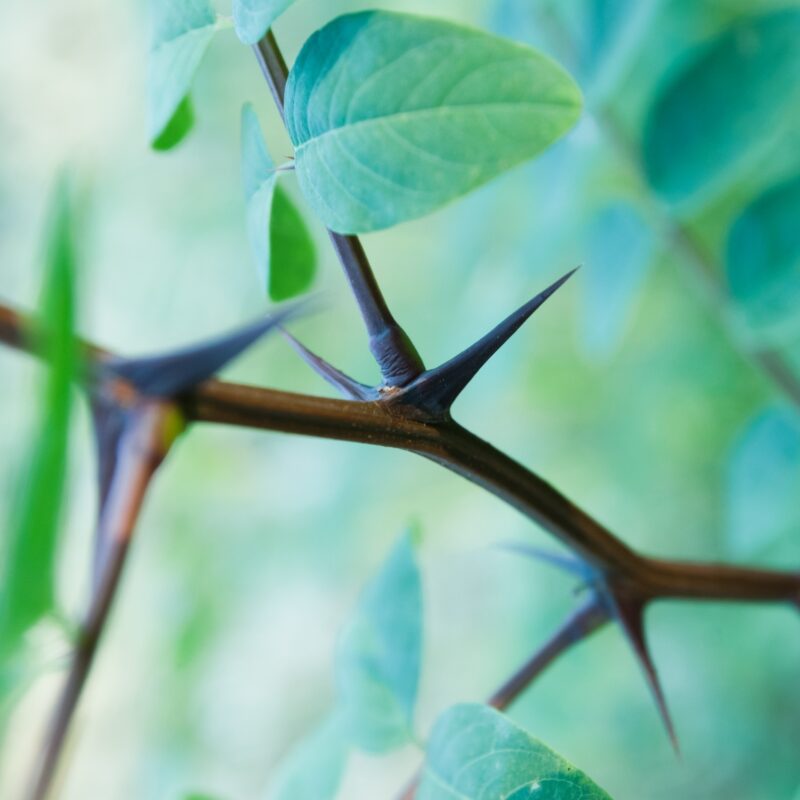
Hard,
sharp
bushes
and
other
thorn
or
spine-bearing
plants
may
make
life
difficult
for
even
the
most
tenacious
invader
when
they
are
installed
immediately
beneath
windows.
Those
without
the
will
or
pain-tolerance
will
probably
look
for
easier
alternatives
at
best.

thorns
At
worst,
the
racket
caused
by
the
intruder,
as
well
as
his
efforts
to
obstruct
your
passage,
will
help
you
buy
more
time
to
flee
or
react
appropriately.
Under
windows
or
adjacent
to
doors,
protective
shrubs
may
be
used
to
block,
slow,
or
channel
attackers’
movements
or
repulse
trespassers.
If
bad
guys
have
to
deal
with
the
gnarliest
of
spiky
plants,
they’ll
think
twice
before
trying
their
luck
on
your
property!
You’ll
have
some
research
to
do
before
you
spend
money
or
plant
seeds
in
the
hopes
of
building
an
unbreachable
natural
barrier,
just
like
with
any
other
fortification.
Luckily,
we
are
here
with
a
guide
on
12
of
the
sharpest,
meanest
and
most
effective
plants
on
earth
that
can
serve
as
living
barriers
around
your
home
and
property.
Table
of
Contents
Will
Plants
Really
Do
the
Job
as
a
Barrier
Against
Trespassers?
Certainly!
While
some
spiny-studded
species
of
flora
might
be
beautiful,
they
are
typically
impenetrable
and
hazardous
to
cross
or
go
around.
In
certain
circumstances,
plants
may
even
be
more
formidable
than
traditional
security
barriers!
Anyone
who
has
ever
had
a
bad
run-in
with
a
truly
vicious
tangle
of
thorns
will
agree!
A
row
of
hefty
cacti
or
a
towering
clump
of
brambles
may
frequently
be
enough
to
deter
an
intruder
from
crossing
your
property
line.
Every
location
has
a
suitable
climate
for
certain
sorts
of
plant
life
that
can
be
used
to
keep
people
out.
All
we
have
to
do
now
is
figure
out
which
plants
will
work
in
our
climate
and
how
they
will
fulfill
our
particular
demands,
whether
it’s
around
the
perimeter
of
our
property
or
immediately
outside
potential
entrances
to
our
home.
You
might
expect
that
this
would
be
both
easier
and
more
difficult
than
using
conventional
barricades
and
other
defensive
procedures,
but
you’ll
be
surprised
at
how
simple
and
satisfying
it
is
with
the
right
information
and
a
little
bit
of
prepper
ingenuity!
Selection
Criteria
for
Security
Plants
There
is
a
solution
to
every
problem,
and
a
plant
for
every
unique
security
requirement.
The
trick
is
figuring
out
which
one
is
right
for
you!
While
certain
plants,
such
as
roses,
can
certainly
cause
damage
and
tear
and
scratch
at
clothes
and
skin
in
addition
to
causing
pain,
others
like
devil’s
thorn
and
firethorn
have
positively
horrible
spines
that
will
dish
out
significant
puncture
wounds
and
entangle
anyone
attempting
to
go
through
them,
much
like
modern
concertina
wire!
You
should
be
quick
to
contact
your
local
greenhouse
or
nursery
to
learn
about
the
appropriate
species
no
matter
where
you
reside.
Once
you’ve
found
a
plant
that
will
thrive
in
your
area,
double-check
that
it’ll
get
along
with
any
nearby
species,
perform
an
acceptable
soil
test
and
then
fertilize
with
the
best
fertilizer
to
ensure
your
new
“border
guards”
grows
nice,
robust
and
fast.
When
it’s
time
to
plant,
you’ll
have
to
decide
whether
to
spend
time
and
effort
while
saving
money
by
planting
a
seed,
sprouting
or
sapling,
then
waiting
for
it
to
develop
before
caring
for
it,
or
trading
savings
for
speed
on
more
mature
cultivars
that
are
ready
to
do
their
jobs
from
the
get-go.
Plants
are
living
things
that
need
to
be
fed
and
protected
from
pests
and
parasites,
so
this
might
be
quite
an
expense
for
a
barrier
that
is
less
sturdy
than
others.
They
can
also
be
defeated
quickly
with
power
tools,
fire,
or
other
special
methods
of
removal.
However,
this
is
usually
a
trifling
concern
since
most
opportunistic
thugs
don’t
want
to
risk
that
kind
of
attention!
Also,
thorns
are
apathetic
to
whether
they
are
piercing
an
intruder,
your
dog
or
cat,
or
a
little
kid.
While
these
are
one
of
the
most
beautiful
and
friendly-looking
defenses
available,
there
are
definite
and
certain
dangers
you
should
consider
as
a
part
of
a
well-rounded
plan.
12
Thorny
Plants
Perfect
for
Deterring
Trespassers
Porcupine
tomato
This
South
and
Central
American
vine
is
a
truly
intimidating
barrier,
since
the
foot-long
thorns
are
particularly
sharp
and
strong.
Devil’s
Thorn
The
source
of
the
popular
legend
about
spiny
flora
causing
its
victims
to
“bleed
from
every
pore,”
this
African
plant
has
wicked
spikes
that
can
draw
blood
with
a
casual
touch!
Roses
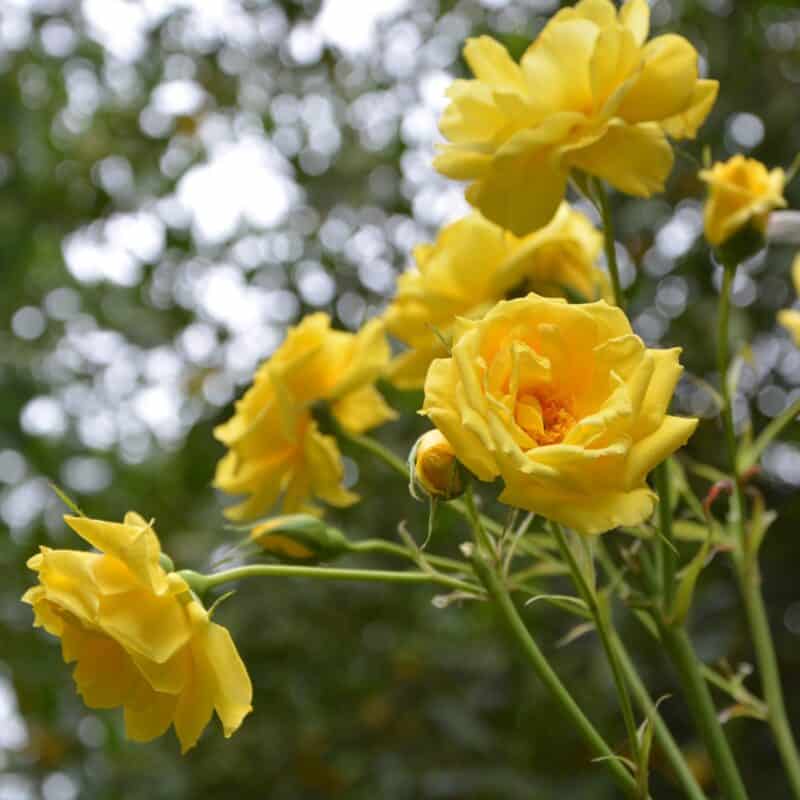
rose
bush
with
yellow
roses
While
we
usually
think
of
the
fragrant
and
elegant
flower
as
a
lovely
gift
or
decoration
rather
than
a
noxious
barrier,
thorns
were
bred
into
most
species
over
time
for
just
such
protective
purposes.
Tiger
Trap
Shrub
This
is
usually
far
too
expensive
to
plant
as
an
outdoor
deterrent,
but
those
who
can
afford
it
swear
by
its
effectiveness
at
stopping
intruders
dead
in
their
tracks!
It
is
truly
one
of
the
toughest
barriers
on
this
list
and
must
be
cut
down
with
special
tools
like
saws
and
machetes.
Bougainvillea
This
floriferous
ornamental
is
a
common
feature
for
fences
and
walls
in
tropical
regions
or
perfect
for
a
reasonably-sized
home
garden.
It
also
serves
as
a
great
source
of
fruit!
Junipers
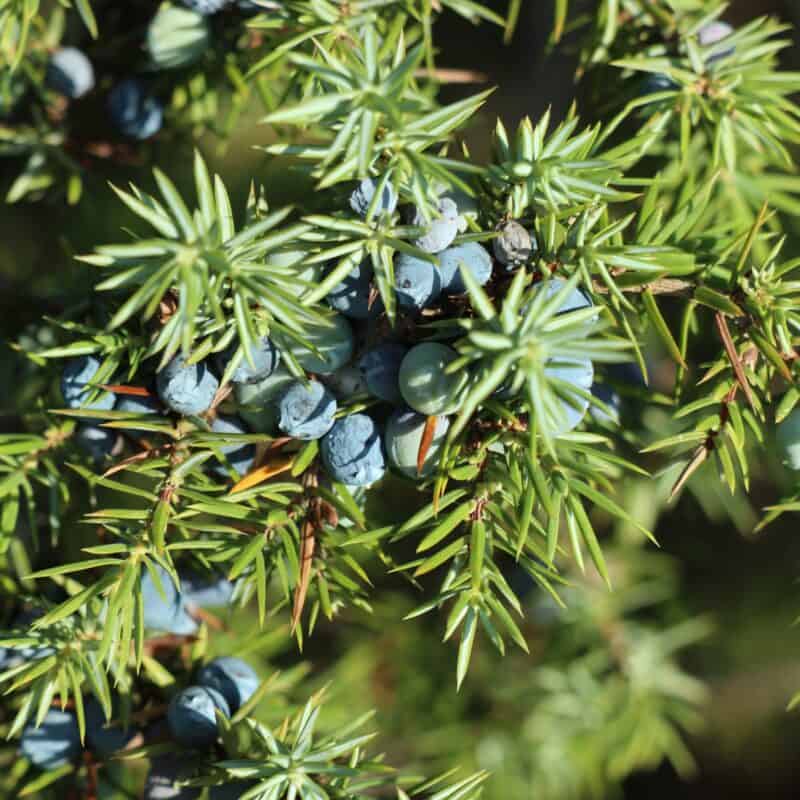
berry
bush
Junipers
produce
sharp
needles
that
can
pierce
skin
and
clothing,
making
them
hazardous
to
humans.
Junipers
thrive
in
a
variety
of
climates
across
the
world,
so
there’s
a
good
chance
one
will
suit
your
needs.
Cactus

Sharp
thorns
on
hardy
desert
succulents
make
excellent
barriers
against
people
and
animals;
they
are
drought
tolerant
and
don’t
need
a
lot
of
water.
Slow
growing
by
nature,
but
there
are
many
forms
available
that
may
be
used
in
ornamental
or
defensive
applications.
Pyracantha
(Firethorn)
The
Himalayan
blackberry,
or
red
sandalwood,
is
a
shrub
with
thorns
and
crimson
orange
berries
that
are
highly
poisonous.
More
significantly
for
us,
it
has
spines
that
can
grow
up
to
four
inches
in
length.
This
plant
is
quite
hardy
and
difficult
to
chop
or
break;
it
can
easily
tower
over
man
height.
Barberry
This
lovely
deciduous
ornamental
has
hooked
thorns
and
impenetrable
foliage
that
make
it
a
tremendous
deterrent.
It
also
produces
small,
inedible
berries
that
are
mildly
toxic.
Hawthorn
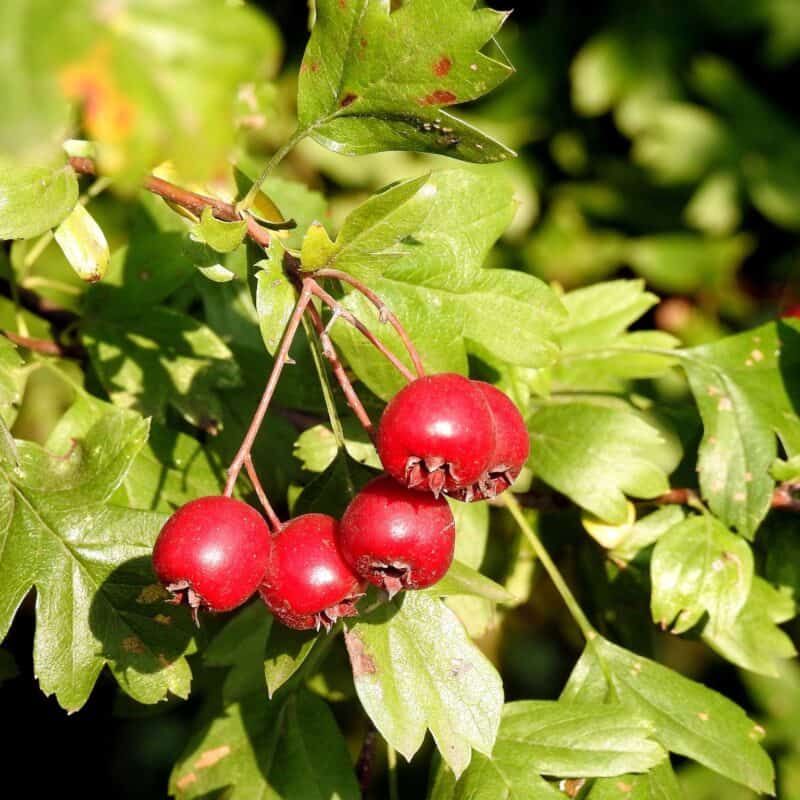
Hawthorns
are
thorny
trees
that
can
reach
a
height
of
about
10
feet
and
a
spread
of
10-30
feet.
It
may
be
used
to
make
a
natural
fence
around
your
yard,
as
well
as
being
an
effective
bird
and
animal
deterrent.
Crown
of
Thorns
This
is
a
South
American
plant
with
an
extremely
tough
spiral
of
sharp
thorns
on
all
sides,
and
it
even
includes
stinging
sap
that
is
ready
to
harm
any
intruder.
It
can
be
used
as
a
hedge
or
barrier
but
will
require
support
to
reach
its
full
height.
There’s
no
way
to
manage
this
plant
safely!
Thrives
in
hot,
sunny
areas
and
produces
red
blooms
when
in
season.
Agave
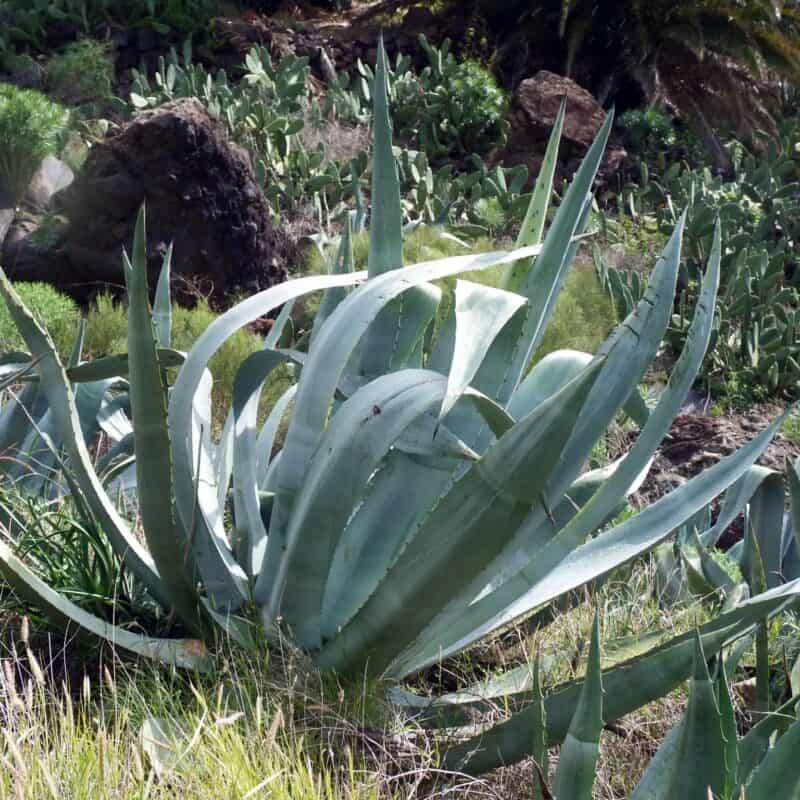
The
spines
of
the
agave
are
sharp,
dagger-shaped
leaves.
It
may
be
used
as
a
wall
or
fence
plant
to
keep
people
and
animals
at
bay.
Some
societies
utilize
thorns
for
sewing
needles
because
they
are
so
powerful!
Brambles
Brambles
are
a
species
of
thorny
shrubs
that
includes
blackberries
and
raspberries.
These
reach
heights
of
around
five
feet
with
a
fast
growth
rate,
a
broad
spread,
and
a
reasonable
stature.
You’ll
also
get
delectable
fruits
for
your
effort,
but
trimming
them
might
be
difficult.
Holly
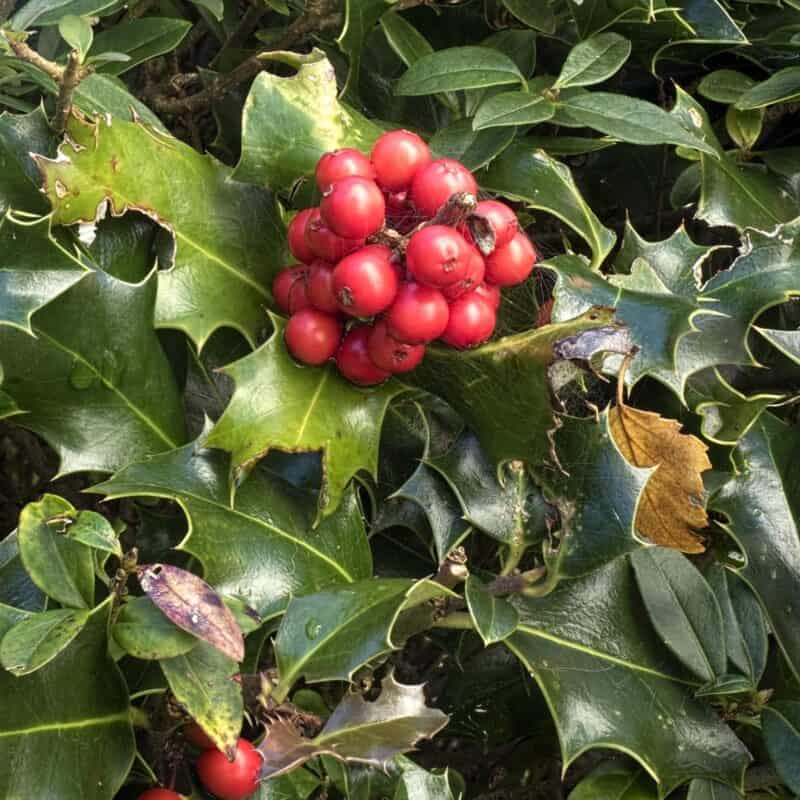
The
berries
are
poisonous,
sharp-toothed
leaves
are
found
on
an
evergreen
shrub
with
spiny
foliage
and
red
fruit.
This
is
one
of
the
less
aggressive
plants
on
our
list,
and
it
makes
a
lot
of
noise
when
disturbed,
perfect
for
alerting
you
to
the
presence
of
an
intruder.
Questions
to
Ask
Before
Choosing
a
Plant
After
reviewing
the
list
above,
the
choices
and
options
might
seem
endless,
and
more
than
a
little
intimidating
if
you
aren’t
an
accomplished
green
thumb!
Don’t
worry,
as
selecting
the
right
plant
is
just
a
matter
of
asking
the
right
questions
in
context
for
your
needs
The
thorns,
spikes,
or
prickles
on
the
plant.
How
sharp
and
painful
are
they?
Will
they
catch
clothing
and
scratch
skin,
or
cause
genuine
lacerations
and
puncture
wounds
on
persons
who
walk
into
them?
The
plant’s
typical
maximum
size.
Will
it
be
big
enough
to
keep
people
away?
Is
there
sufficient
space
near
a
door
or
window
for
it
to
grow?
Does
it
grow
sufficiently
large
and
thick
to
fulfill
the
shape
criteria
as
a
hedge
or
fence?
The
thickness
or
fullness
of
the
foliage.
What
will
the
vegetation
be
like?
How
thick
will
the
leaves
be?
Will
it
provide
visual
obstruction
on
the
other
side?
How
difficult
will
it
be
to
trim
and
shape
it?
The
rate
at
which
the
plant
grows.
How
quickly
will
it
achieve
its
full
size?
When
will
it
be
able
to
provide
any
protective
value?
Will
you
save
time
by
planting
seeds
or
buying
immature
plants,
or
will
you
have
to
spend
a
lot
of
money
to
get
a
viable
plant?
Plant
varieties
that
are
suitable
for
your
region.
Make
sure
the
plants
you
choose
will
thrive
in
your
climate
and
soil
type.
Some
plants
are
pickier
than
others,
and
some
might
not
grow
well
in
conditions
that
are
too
hot,
dry,
shady
or
breezy.
The
color
and
shape
of
the
plant.
Will
it
blend
in
with
its
surroundings,
or
will
it
stand
out
among
other
plants?
Is
it
pleasant
if
aesthetics
are
a
high
priority
for
your
home?
Cost
is
a
significant
consideration.
There
is
always
a
price
tag
associated
with
adding
plants
for
security
reasons,
just
like
any
other
product.
You’ll
need
to
add
the
cost
of
plants,
if
applicable,
as
well
as
any
irrigation
and
maintenance
expenses.
The
ideal
approach
to
figure
out
which
plants
are
appropriate
for
security
purposes
is
to
talk
with
other
like-minded
preppers
in
your
region.
There’s
a
good
chance
someone
has
already
solved
this
issue,
and
can
offer
helpful
suggestions.
That
does
it
for
the
all
the
questions
you
need
to
ask
yourself,
or
a
prospective
nursery,
before
you
commit
to
installing
your
own
living
wall
of
barbed
“wire!”
Conclusion
You
now
know
how
to
choose
and
cultivate
plants
that
will
deter
intruders.
Remember
that
the
most
important
aspect
of
plant
selection
is
to
pick
plants
that
are
appropriate
for
your
region
and
soil
type,
as
well
as
the
plant’s
size,
density,
and
overall
ferocity.
With
a
little
diligence,
you
can
enjoy
greatly
increased
security
from
plants
that
will
compliment
the
aesthetics
of
your
home
or
property.
Have
fun
planting
and
don’t
forget
your
gloves!

Tom
Marlowe
grew
up
with
a
gun
in
his
hand,
and
has
held
all
kinds
of
jobs
in
the
gun
industry:
range
safety,
sales,
instruction
and
consulting,
He
has
the
experience
in
helping
civilian
shooters
figure
out
what
firearms
work
best
for
them.
